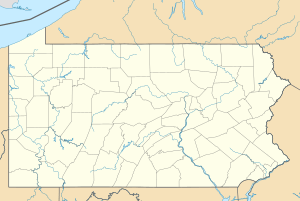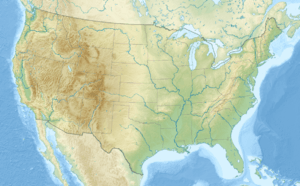Braddocks Run facts for kids
Quick facts for kids Braddocks Run |
|
|---|---|
|
Location of Braddocks Run mouth
|
|
| Other name(s) | Tributary to Youghiogheny River |
| Country | United States |
| State | Pennsylvania |
| County | Somerset |
| Physical characteristics | |
| Main source | Chub Run divide about 1 mile south of Addison, Pennsylvania 1,760 ft (540 m) 39°44′01″N 079°20′20″W / 39.73361°N 79.33889°W |
| River mouth | Youghiogheny River in Youghiogheny River Lake about 0.25 miles south of Somerfield, Pennsylvania 1,439 ft (439 m) 39°44′33″N 079°22′57″W / 39.74250°N 79.38250°W |
| Length | 2.86 mi (4.60 km) |
| Basin features | |
| Progression | generally northwest |
| River system | Monongahela River |
| Basin size | 4.49 square miles (11.6 km2) |
| Tributaries |
|
| Bridges | Braddocks Run Road |
Braddocks Run is a small stream, or "run," located in Somerset County, Pennsylvania. It flows for about 2.86 miles (4.60 km). This stream is a "tributary," which means it's a smaller stream that flows into a larger one. Braddocks Run joins the Youghiogheny River.
What's in a Name?
Sometimes, places have more than one name. Braddocks Run is also known by another name. Historically, people have called it "Braddock Run." This information comes from the Geographic Names Information System.
Where Does Braddocks Run Flow?
Braddocks Run starts in a place about 1 mile (1.6 km) south of a town called Addison, Pennsylvania. From there, it flows mostly towards the northwest.
Its journey ends when it flows into the Youghiogheny River. This happens within the Youghiogheny River Lake, which is a large body of water. The meeting point is about 0.25 miles (0.40 km) south of Somerfield, Pennsylvania.
The Area Around the Run
The land that Braddocks Run drains is called its "watershed." This area covers about 4.49 square miles (11.6 km²). A watershed is like a big bowl where all the rain and snow eventually flow into one stream or river.
This area gets a good amount of rain each year, about 45.7 inches (116 cm). A large part of the watershed, about 62%, is covered in forests. This helps keep the water clean and supports local wildlife.
 | Leon Lynch |
 | Milton P. Webster |
 | Ferdinand Smith |



